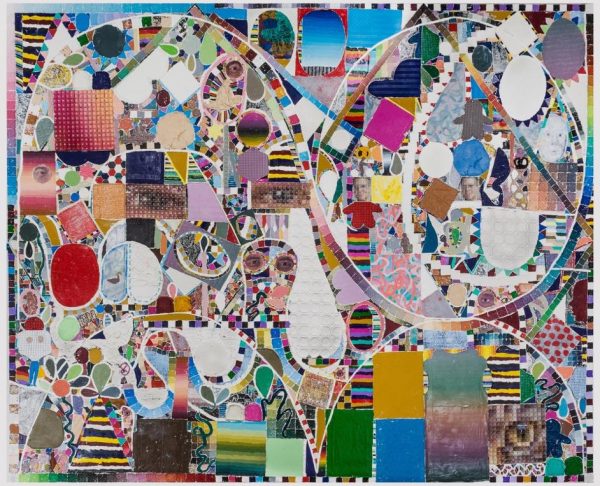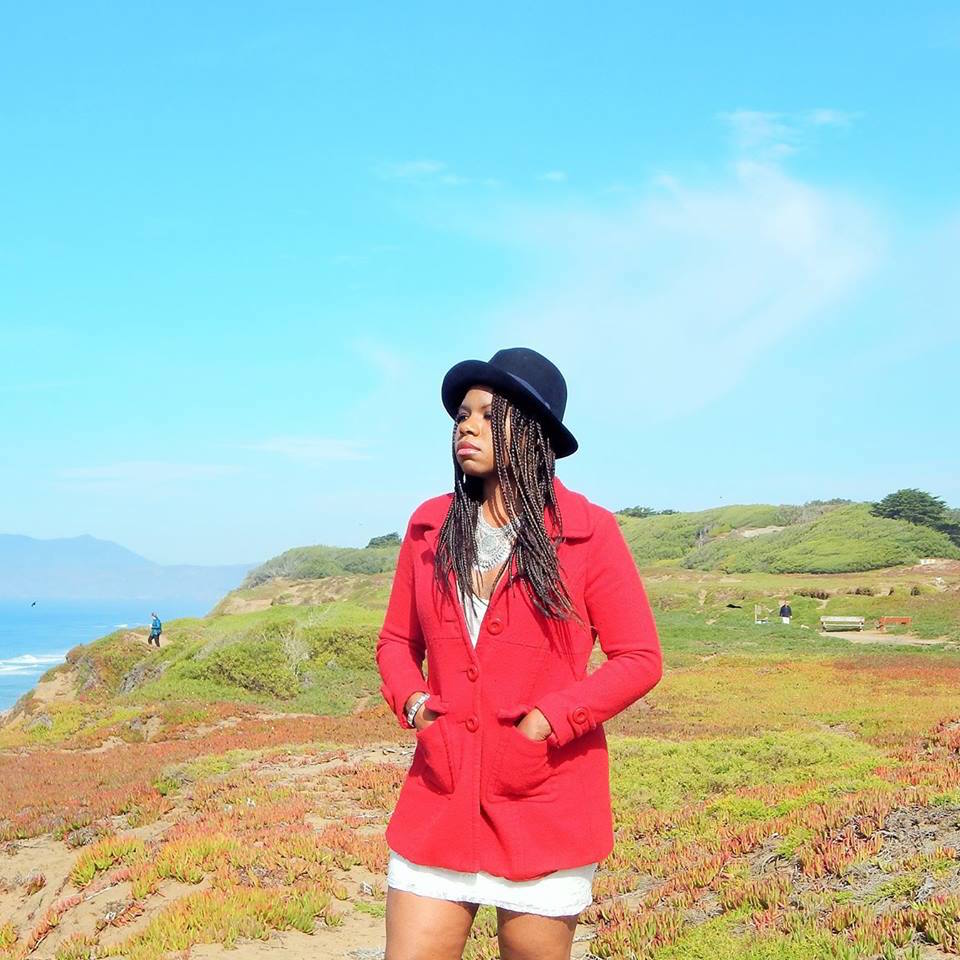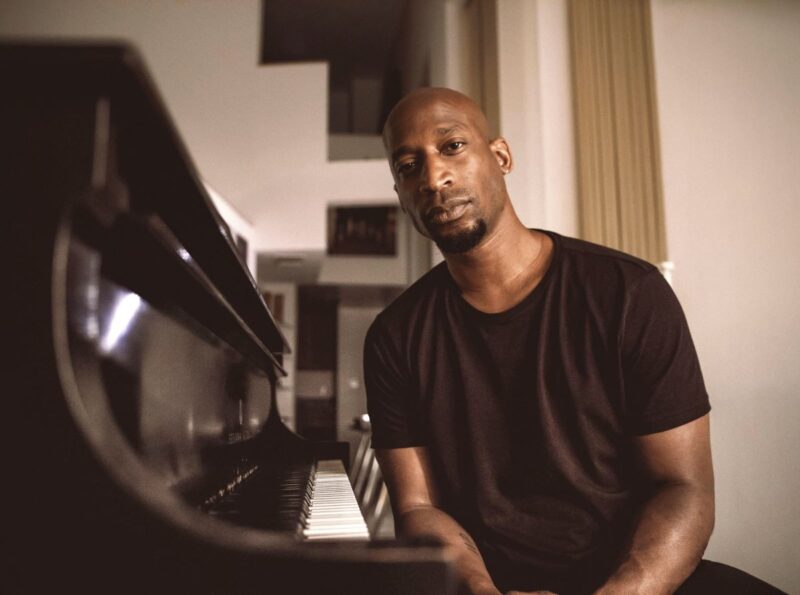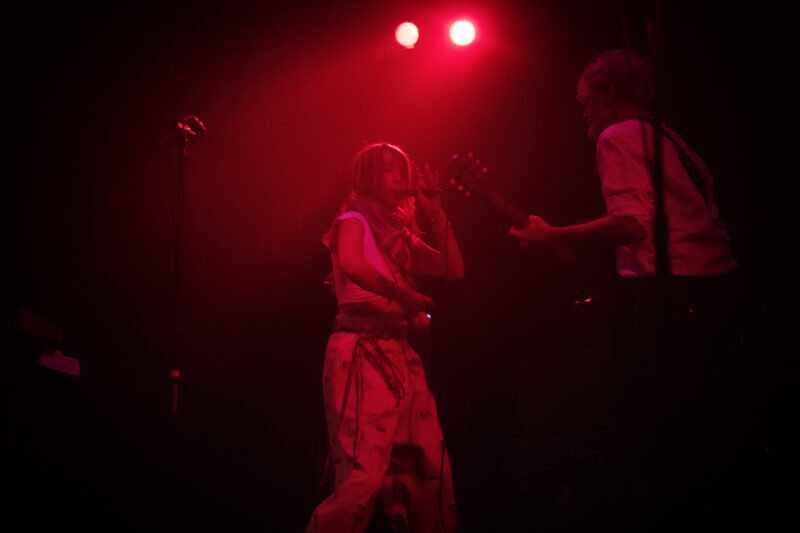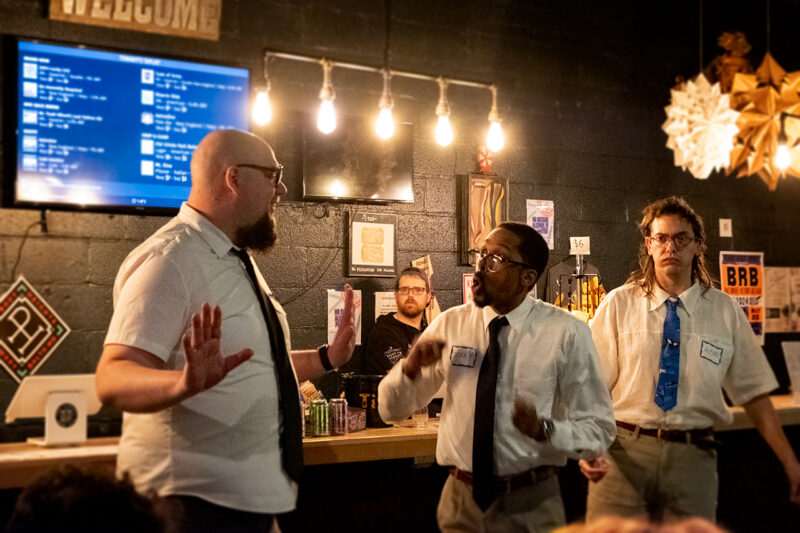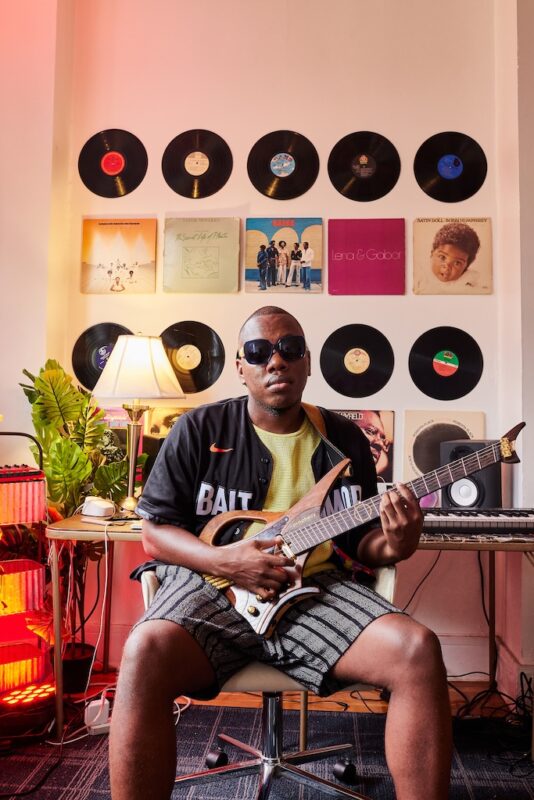A live music review + interview with the Baltimore Folk-Soul band, Jordannah Elizabeth
by Fire Angelou
When the lights stop on August 24, a warm and cloudy Wednesday evening at The Crown, so does guitarist Dave Huemann. By the end of the sound and light collaborative installation with Dan Conrad, the room is meditative, ethereal and childlike, the perfect space for the piercing and folk-soul comfort of Baltimore-based band, Jordannah Elizabeth.
The Crown is flushed in deep red lights and gold lamps creating an atmosphere between rock and romance. Plants stationed in the walls are lit up by greenlights adding artificial nature by the stage and bar. It is a quiet night, the streets are mostly empty and there are about thirty or so people in The Red Room, anxious and waiting to be filled with the right music to get them through the week.
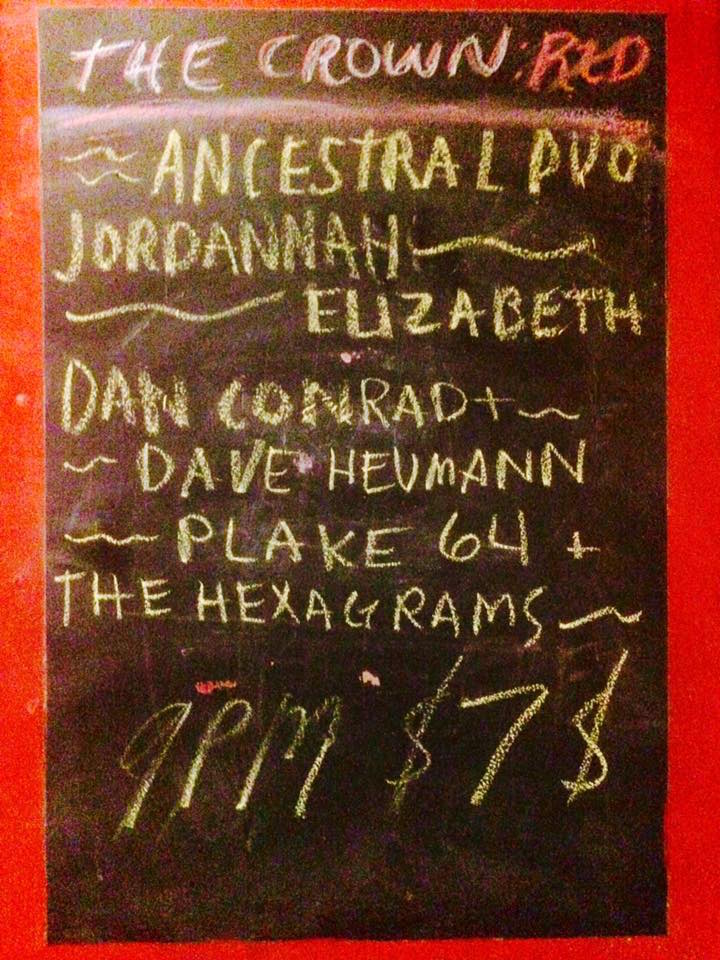
The lights on the stage spring back on, awakening the crowd from a spacey, ethereal trance. Funky, jazz music blasts through the speakers as cellist Chanel Whitehead gets positioned on stage. Audience members stretch their bodies and refill their drinks while guitarist Miles Garnett and lead singer Jordannah Elizabeth head to the stage with their instruments on and shoes off. The stage lights are white and flooding. Everyone is focused on tuning their instruments and themselves, as this is the band’s first performance since last year on July 25 at Metro Gallery, and the launch of their international tour.
Elizabeth transforms the youthful silence into a mature and ancient sound with the band’s first piece, “Six Years.” Full of breath, perfectly timed space and whispers, Elizabeth’s starts the song acapella. Her voice feels sultry and timeless, like you’ve heard it before. It fills the room, yet has the audience leaning in for more. She switches between sugary mellow whispers and long-range high notes before Whitehead softly enters. The room is still, reflective and perhaps thinking of lovers, as Jordannah sings these lyrics on repeat, “If you want me, I’d come running.”
The relatability of Elizabeth summons some of the audience members to sit on the floor. She sits on a black stool, dressed in tight denim jeans and a classy black shirt, with her feet arching and her eyes traveling. She is going somewhere. She is remembering home.
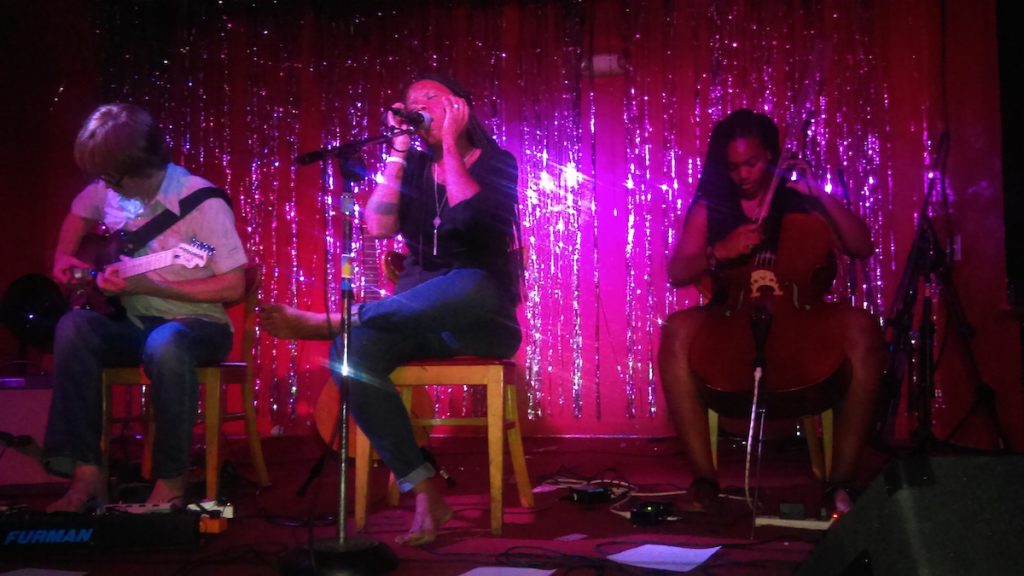
The band builds a rhythm with each other. They frequently observe each other and ride into one other’s empty spaces. Their second song, “Dancing barefoot on a wooden floor”, is somber and peaceful. Each musician fosters their own space; Elizabeth holds the microphone close like she misses it, Garnett and Whitehead turn inward with eyes on their strings. The third song is from their album, “Bring to the table”, and offers a moment in musical spontaneity. The cello experimental song is led by Whitehead. She begins her rift and then — a hip hop beat drops.
The crowd rocks for a moment before Whitehead scatters, looking for something, notifying the audience that the beat was a mistake. Turning a mistake into a moment, Elizabeth says, “The hip hop gods just showed up!”
This is how the show has been: there are no mistakes. There are only human moments and it’s all a part of the show.
Elizabeth becomes as loose as the room, as Whitehead experiments with her cello. Elizabeth’s hands are dancing around forming circular shapes and swirling lines. Her hands are a song within themselves. Simultaneously, the band experiments with body and music. The audience is yearning, eyes forward and room silent, as they settle into the groove of Whitehead and later, her synchronization with Garnett. Elizabeth sits forward with her head towards the ground, as the cello and guitar sing.
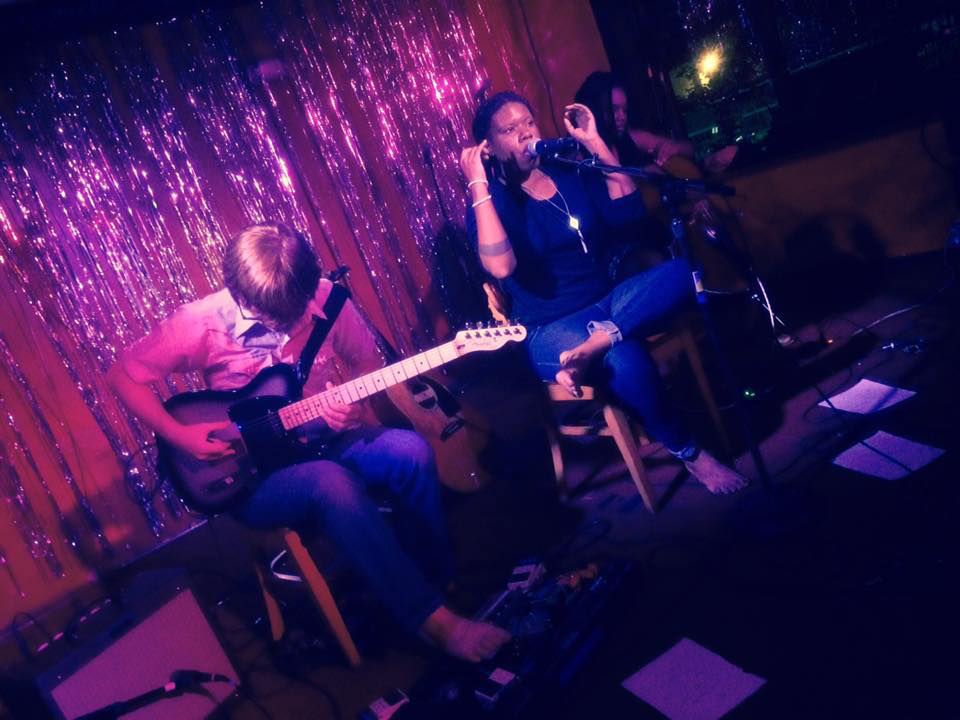
Guitarist Dave Huemann comes back on stage a bit too early for their collaborative song, “I Didn’t Play it Like I Should”, but Elizabeth welcomes him. Remember, it’s all about the moment. Huemann starts to set up, and there are sound difficulties for a few minutes. Elizabeth is a detailed storyteller, shaped by her career as a music journalist, and in between songs, she speaks about her day and her dreams.
It is easy to forget the static of sound as Elizabeth talks about the evolution of her music and a dream she had after seeing a mural for the Charleston victims. In the dream, Elizabeth says, there were a group of people singing a gospel. She sings the gospel from her dream and brings a ceremonial energy to the room. Her voice is a mixture between Sunday morning gospels, 90’s R&B, and psychedelic folk. She gives a new sound to praise music. She asks the audience for a few moments of silence for victims in Charleston, South Carolina, Turkey and Baltimore.
After the silence and finalizing the sound-check, Huemann begins his riff and Garnett syncs with him. After three or four, Elizabeth enters. Almost unknowingly, Huemann adds a deep, opulent, and country-rich voice to Elizabeth’s, forming a silky duet. Their sound, a song from her upcoming album, The Warmest Low, is addictively repetitive and remorsefully romantic. Huemann adds more earth-tones to Elizabeth’s milky, yet rocky voice. Their harmony tells two different sides of the same story.
It is about midnight when the band closes with a set of improvisation. It takes a few seconds for someone to start, but when they do, the 4-minute improvisation, includes a folk rendition of Drake’s chorus from The Game’s Song, 100, and more. Teeming with high-pitched wordless notes, synchronized imprositivations, and sporadic hip-hop music covers, the band takes us past midnight, curious and fulfilled.
The set is about 30 minutes and comes to a slow close. The crowd cheers as the lights come back on, strong and illuminating. Elizabeth moves her microphone and hugs Whitehead, barefoot and glowing.
“When I hear that music it’s like I’m made from a song,” Elizabeth’s lyrics, sung during their closing improvisation, replay in my head as chatter erupts through The Crown. After Jordannah Elizabeth’s performance, I can’t help but feel like I, too, am a song.
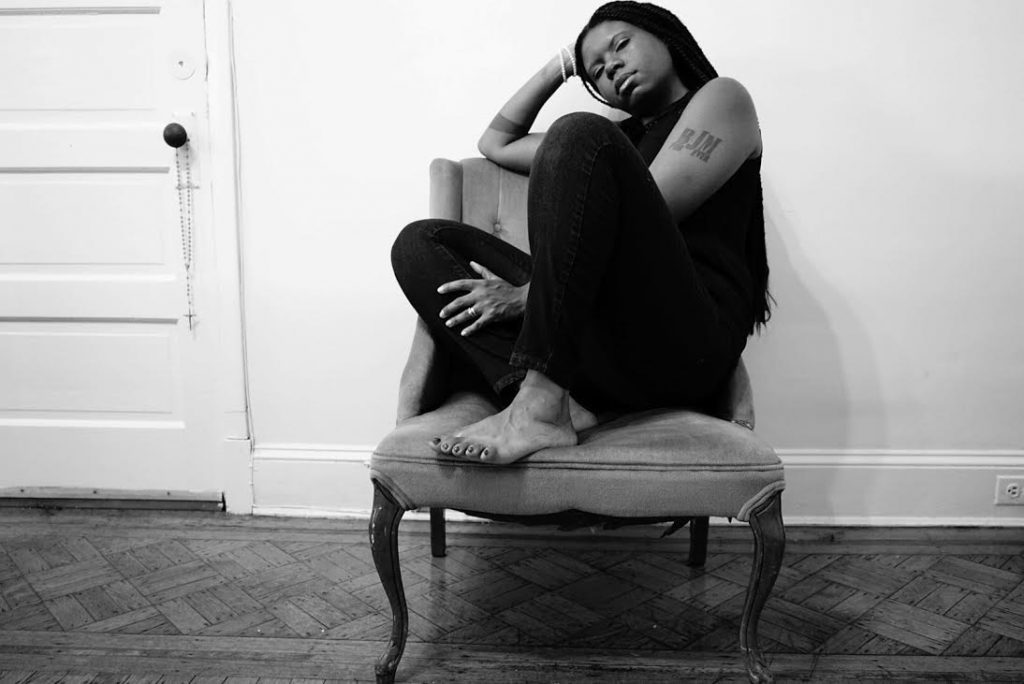
Q&A with Jordannah Elizabeth:
“My art is about discovery and subtlety. You can’t click it. It can’t be found or disturbed before it is presented because I have nothing to prove outside of what it is in that very moment and shortly thereafter.” – Jordannah Elizabeth
During your last performance in Baltimore, you took your shoes off (as well as your guitarist), why did you take your shoes off? What is your process in preparing to perform?
There are a couple of reasons:
There is a an esoteric (I feel it could be considered holistic) term called “grounding.” I am an avid daydreamer. My head is always in the clouds, when we sit on the floor, or take our shoes off and walk on the floor or on the Earth, it grounds us as human beings – keeping our “feet on the ground” which allows us to be more present in immediate situations and to reaffirm our intimate relationship with Earth and our environments.
Also, early on in my event booking and promoting career, I began wearing high heels to my shows. To this day, I may show up at an event with really unique looking high heel shoes. By the end of the night of my shows, when the headliners would go on, or one of my fave bands performed, I would kick off my shoes so I could dance more easily. It’s just kind of my thing, my “calling card.” It also creates a sense of mystery and rebellion… and even trust, when I leave my shoes lying around a venue, but I’ve never had my shoes stolen in the 13 years I’ve been booking and performing.
Miles? I don’t know why Miles does it. You’d have to ask him. He rehearses and records barefoot. I don’t. We’ve been friends for a number of years, but I just found out he doesn’t wear shoes while playing since he joined my band a few weeks ago.
How did you start your career as a musician?
I stumbled my way into it and and I find my way through it. My mother bought be a guitar when I was 13 and I taught myself to play. My friend, Kat Holiday, gave me a 1974 Fender cutaway when I was 17 and I just started gigging. People tried to tell me I was not a good musician for the first few years I started playing out, but I didn’t listen to my critics. I just kept playing. Almost 20 years later, I owe my talent to just being persistent and working hard. Also, I do my best to listen to and learn from elders and/or more successful musicians.
What is your process for creating music?
My albums usually have concepts. I have muses. I’ve been writing songs for so long that I can write a decent one in less than 10 minutes, but the process of preparing to write a song is a little more complex. My studio work has a lot to do with collaboration. I like to take my hands off the wheel to some degree and bring in great musicians, encouraging them to have fun experimenting with my simplistic folk songs.
Working with Dave Heumann on this album was fun because he has an imagination and he is a very disciplined songwriter. So, he could hear ideas and irony in my music, which I thought was great. It’s a kind of artistic voyeurism for me. I like to create spontaneous (yet professional) recording and performance environments. I never want artists to feel stifled or like it is all about my vision when they come in. I try to work with very smart, focused and experienced musicians and drop them in a home studio and let them just open up and create.
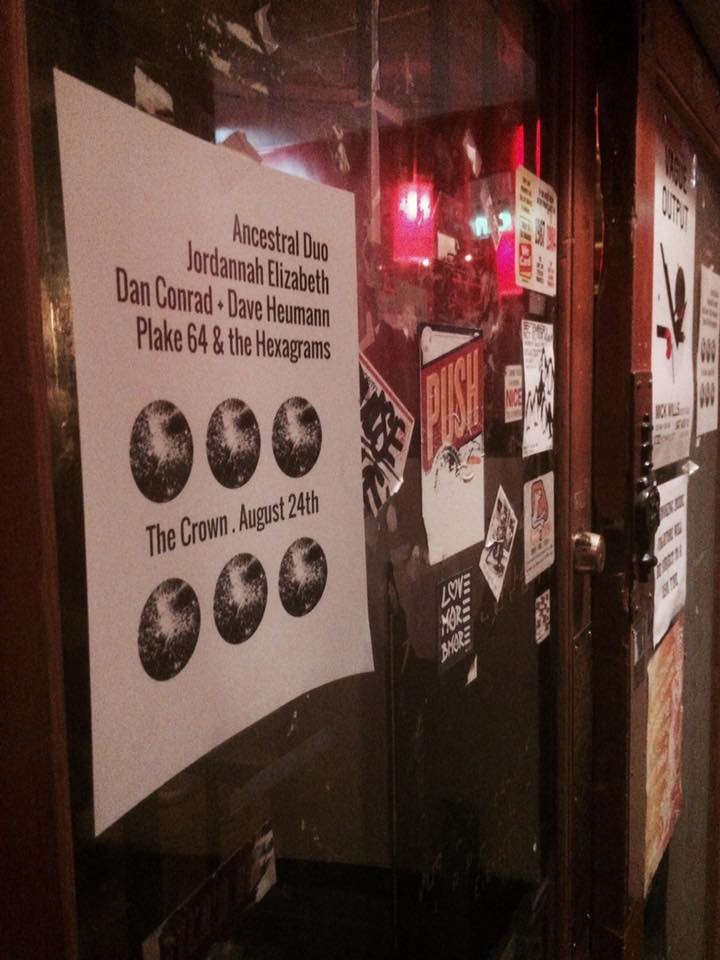
What do you try to bring out of you when you sing? What do you channel to get to that sultry, deep and ancient voice?
The most important thing I can going to say about being a singer is that I consider my voice an instrument. I am a classically trained vocalist, and I think going to classical music school teaches you to use your voice and body as a element and not a spectacle. In opera, you are rarely the only character in the story, so you have to learn to create the story and emotion through your singing voice. That’s why I could never be a pop star, it’s just a different perspective on the voice and the role as a singer.
I am not against being successful, but I see music arrangement, my back up singers, etc., as serious melded elements. It also is very important to understand vocals as an instrument when improvising and performing experimental music. I have to know when to pull out and let the other musicians create the atmosphere. My voice has to work with other instruments in improv because if I don’t understand how to bend and weave in an experimental environment, musicians will be doing nothing but try to take my lead all the time and that’s not how I want to collaborate on stage. I know I use “improvise” and “experimentation” interchangeably in the rant. I don’t really feel like I have to explain myself as to why. If you see my show, you’ll understand.
I am a sensual human being. I can’t say that I channel anything specifically, because I am more interested in creating and playing off the immediate atmosphere going on in the room when I am about to perform or am on stage.
Who are your major influencers as a musician?
Lately I have been into male musicians: Lightnin Hopkins, Leadbelly, Townes Van Zandt, Lee Hazlewood, Kurt Cobain and Jacque Brel – so there’s a bit of a small dose of masculine energy that is coming through on my live performances (the current ones). I am a very feminine being, so I like to explore different energies and styles when I can. I also enjoy the voices of Nina Simone, Bonnie Raitt, Sarah Vaughn, Nico, Ella Fitzgerald, Dolly Parton, Karen Carpenter, Erykah Badu. But the low tones? I am just getting older and my voice has changed a bit. When I sing high, I am not sure it matches the growth I’ve experienced in maturity and music style.
You are from Baltimore, but spent some time in other cities as well. How has your experience been as a musician in Baltimore? What is your advice to other musicians in the city for advancement?
Being a musician in Baltimore is hard. I am a working artist and when it comes to performing and working as an artist in Baltimore, you have to be selective about where and how much you perform. I like to pay my bands. I like to pay back my label when they are helpful with my budgets. When you work with labels and investors and you’re under contract or have a long standing project when them, it’s smart to pay on your budget. It’s good training if you decide to work with a major.
In the music business it is called recouping and in business it is called ROI – return on investment. Local venues, promoters, local labels and musicians have very little concept of these processes. Pay!!! When I get paid, my money goes to my band and my label. I rarely take anything home. There have been times where I was the label, so the money I made went into my tours or my clothing for a photoshoot or paying an assistant, etc.
Baltimore doesn’t respect that. There are a couple of venues here where I know I will be able to pay my bands, but not enough. I just asked my band if they are willing to play DC, Philly, NYC. I have to. I have to make a living or get enough exposure at a show where it is worth it or I get a day job and forget about it. It’s either or.
With all this said, my advice is never do it for money, but be professional with the money you earn as an artist. Invest in your image, recordings, your instruments, equipment, pay your band. Have goals. If you know you want to be a professional artist, travel and tour. If you want to conquer the local scene, work hard and be a great band because Baltimore has some of the best musicians in America. Learn from your elder musicians and be humble. They’ll give you infinite lessons, ideas, tips and support if you respect that they know a lot more than you do.
I come back to Baltimore to learn and craft my music, then I take what I’ve learned across the world. I have a lot of respect for the local arts scene as a powerful place with resources that help you craft your artistic ideas and learn to compose, improvise, jam, record, etc. Get your hands dirty. For me, it’s always an honor to live here. Shout out to the Bay Area who loves on me and supports me as well.
You have done a lot of work as a music journalist. How has your journalism influenced your music?
Music journalism doesn’t influence my music whatsoever. Being a musician affects my music journalism. I can talk to musicians with a level of understanding during my interviews, so we can cut to the chase and skip over the remedial questions and get to the meat of the artist’s new project or process.
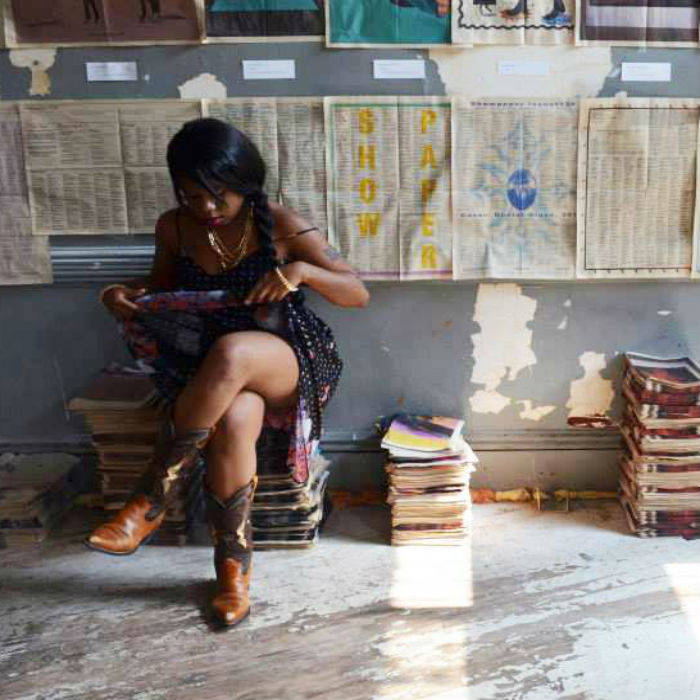
What was the most transformational experience for you throughout your music career?
Loss. Loss always transforms me as a musician. Collaboration and the humility of meeting people who do what they can to help me create my vision. Loss and my friends and listeners going to lengths to support my art.
You are going on an international tour. How did you go about planning your tour? What strategies would you give to other Baltimore artists who want to do the same?
I treated myself to a trip to Berlin for my 30th birthday, but I can’t just travel without playing a gig or two. I miss my friends and arts community in the Bay Area, so I wanted to spend a couple of weeks there. I was able to book three shows through friends, clubs and bookers I know. People just know me and like what I do, so I go where I am welcomed.
Strategy: Never work alone. Bounce ideas off people, even if you have to call your mom up and go, “Hey, I am planning on touring, how does this route sound to you?”.
See, I am kind of a bad example because I have been booking my own tours for over a decade, so I have a honed, intuitive strategy that doesn’t really translate well in writing. It’s hard for me to explain something that has kind of become second nature. I booked my entire European tour across 4 countries. I write out my ideas in notebooks and sit with my label or publicists and share my ideas, to see what they think, how we can afford it, etc. I ask other musicians who have traveled around for advice. I don’t rush and book everything so solid in a manner where I can’t maneuver a new development. That takes time to learn when booking plane tickets, housing and travel.
Creativity is not always easy – it takes persistent hard work to be successful. What do you do for yourself to maintain creative energy and balance?
I don’t force anything. And I look at my songwriting as a profession. It’s a balance. If I don’t want to write music I won’t, but if a publishing company comes to me and says, “Jordannah, we have this artist who likes your work, can you write us a song?” or “Jordannah, we’ve got some placements we’re looking to put your music on for TV or film, can you re-record this demo you did 5 years ago.” I have to get up and do it.
Artistically, I have to create space for myself even if the songs stem from a label saying they want me to put out some songs, it’s still my art.
I withdraw, I sleep, I dream, I feel. That’s why my songs can come across so deep and potent. I put myself through a lot of self reflection and challenge myself emotionally to express myself through music.
So, when I am doing business, I have to work with people who “get it” and want the music for exactly what it is and who want me for exactly who I am. I am not a machine and never plan to allow myself to be treated like one.
****
Author Fire Angelou is a writer and spoken word artist from Baltimore, MD. She is a columnist at international website, AFROPUNK, and Editor-in-chief of online magazine, Daughters of the Diaspora. Through spoken word, memoirs, essays and sci-fi, she explores Black womanhood and the survival of the African Diaspora. Her works have been translated in Spanish and Portuguese. She has performed from southern California to New York City, across the midwest and internationally in Cuba. She believes that stories can change people.

